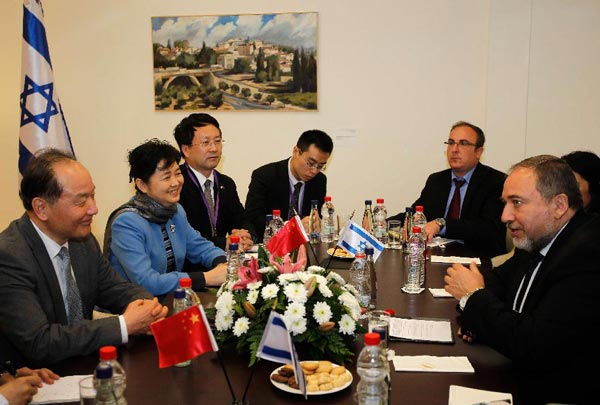

 |
| Israeli Foreign Minister Avigdor Lieberman (front, R) meets with visiting Chinese Special Envoy to the Middle East Wu Sike (front, L) in Jerusalem, March 10, 2014. (Xinhua/Muammar Awad) |
BEIJING, April 8 -- With peace and development as the main theme of the times, China and Middle East countries have broad common interests and Chinese wisdom will help the region push forward peaceful development.
Amid multipolarization and economic globalization, China and the Middle East have been closely linked with each other thanks to a strategy of connectivity, mutual benefit and win-win cooperation.
In recent years, the Middle East has become an important element for the layout of China's global assets and capacity, with a large number of Chinese enterprises swarming into the region.
In the meantime, more Chinese tourists went to Middle East countries that boast a long history and abundant tourism resources.
For China, the world's second-largest economy, the Middle East is a region full of opportunities and risks.
As China is accelerating efforts to build an open economic system and expand international cooperation, it is impossible for the country to detach itself from the affairs in the Middle East, whose peaceful development also relates to China's interests and destiny.
Recently, the Middle East attracted worldwide attention again amid ongoing Saudi-led airstrikes against the Shiite Houthi rebels in Yemen and a worsening humanitarian situation on the ground.
In order to protect the security interests of overseas Chinese nationals, the Chinese government launched a massive evacuation mission late last month.
In four operations since March 29, a total of 629 Chinese nationals and 279 foreign citizens were successfully evacuated aboard Chinese vessels from Yemen.
Lending a helping hand to its nationals as well as citizens of 15 other countries in need, China has played its role as a major responsible country and demonstrated the spirit of humanitarianism.
Meanwhile, Iran and six world powers reached a framework accord last week on parameters to resolve major issues on Iran's nuclear program, with a view to sealing a final comprehensive accord by the end of June.
China, as an important negotiator, put forward a number of constructive proposals when the talks nearly came to a deadlock, so that the negotiation could develop on the right track.
The evacuation mission in Yemen and the Iranian nuclear talks showed that China attaches great importance to the situation in the Middle East and plays an active role in helping the region promote peaceful development.
Peace in the Middle East is always a major concern and focus for the whole world.
As a permanent member of the UN Security Council, China is shouldering more responsibilities in safeguarding world and regional peace and development.
The country has endeavored to not only mediate complicated regional hot issues, but also boost the peace process in the Middle East.
Besides lending a hand in international humanitarian missions, China has been seeking a unique approach to addressing global hot issues, with a focus on adopting an objective and impartial position and offering multi-pronged solutions.
On a number of international and regional issues, China has always sought a political settlement that addresses the concerns of all involved, rather than resorting to the use of force or sanctions.
The "Belt and Road" initiatives, actively promoted by China now, are inclusive and mutually beneficial, accommodating the need and interest of all involved parties.
"The international community, especially Middle Eastern nations, is looking forward to China's mediation," said Muhammad Abdel-Wahab Al-Sakit, a former Arab League ambassador to China.
"China, as a Third World and developing country, sincerely cares about the settlement of the Middle East issue," he added.
 J-11 fighters in air exercise
J-11 fighters in air exercise Beauties dancing on the rings
Beauties dancing on the rings Attendants-to-be join Mr. & Miss Campus Contest
Attendants-to-be join Mr. & Miss Campus Contest Beijing's toughest anti-smoking law takes effect
Beijing's toughest anti-smoking law takes effect Family lives in cave for about 50 years in SW China
Family lives in cave for about 50 years in SW China PLA soldiers operating vehicle-mounted guns in drill
PLA soldiers operating vehicle-mounted guns in drill Blind carpenter in E China's Jiangxi
Blind carpenter in E China's Jiangxi China hosts overseas disaster relief exercise for the first time
China hosts overseas disaster relief exercise for the first time 20 pairs of twins who will become flight attendants in Sichuan
20 pairs of twins who will become flight attendants in Sichuan Obama is sowing discontent in S.China Sea
Obama is sowing discontent in S.China Sea Rescuers work through night to reach cruise ship survivors
Rescuers work through night to reach cruise ship survivors Driving through limbo
Driving through limbo Facing down MERS
Facing down MERSDay|Week